Since the Bootcamps were so popular at Spectrum that we ran out of prints, we promised to make pdfs of the one-sheets available after the con—now revised after a bunch of input from artists and more art directors.
Now we’re releasing the one-sheet from the third Bootcamp: Getting You Paid: Contracts, Licensing, Invoicing, and Copyrights. This is the most difficult and least understood topic and yet also one of the most critical. How do you protect yourself, and how do you get paid?
We’ve tried to boil down contracts and licensing to the most basic terminology, and included as many best practices as we could cram on one page about invoicing and paperwork. Getting proper paperwork out of my artists is one of my hardest jobs as an Art Director, and a lot of payments are delayed or go MIA because of paperwork filled out improperly. Read up, and get payments quicker and easier.
You can also read some of my first posts on Muddy Colors, all about contracts and rights and money: Getting You Paid, Part 1 and Getting You Paid, Part 2.
Copyrighting your work is a step that should be as automatic as backing up your work, and it’s cheaper and easier than you think. And it pays off immediately if you ever find someone stealing your work. Definitely read that section in the onesheet above, and go to www.copyright.gov to protect your work. A whole year’s worth of images can be protected on one application, for only $55! Another great resource about copyrights is The Copyright Zone, so check them out. It’s aimed more at photographers, but applies across any visual media.
Meanwhile, we’ve gotten hands down, the most questions about contracts. We went half an hour over time in that bootcamp and we could have kept going for another hour easily. Contracts and rights and licensing is so confusing, and made a thousand times worse by dense legalese. There’s a reason for all that legalese (besides insuring you need to pay a lawyer to unravel it) – the “hereto”s and “wherein”s are all necessary language to close any loopholes a good contract lawyer can sneak around. However, we’ve found a lot of artists don’t use contracts at all because they don’t understand them. So, we’ve made a template contract for you. We’ve boiled it down to the most simple language we possibly could, and tried to put in the most generic and useful language in about sticking points like kill fees and revisions:
We believe it’s better to use a simple contract rather than not use a contract at all. Please feel free to download the template contract above and adapt it to your purposes. It will suffice for many of the smaller jobs you do. (Bigger jobs from bigger companies will usually come with their own contracts.) Due to the adaptable bits, we can’t guarantee 100% watertight legality on this contract, so no suing us. Use at your own risk. If you don’t want to use this, USE SOMETHING. PACT has some great templates on their site as well, with some stricter language. Or you can ask a more established artist if you can peek at their contract and see if they’ll let you copy it.
All of this material, in greater depth and with links to deeper resources will be available in the Make Art Work book. We’ve been working hard at it, and just shot a bunch of interviews for the kickstarter campaign at Illustration Master Class earlier this month. (Thank you for everyone who volunteered to be in the video, as well as all the brave souls who play tested our next little project.) We can’t wait to finish the book and get the kickstarter launched a bit later this summer! So sign up for the Drawn + Drafted newsletter to keep on top of the book, and all the other projects we have in store.
And since we’re still revising the book, add any questions you have below, and we’ll try to answer them here, and we’ll also definitely make sure we cover them in the book!
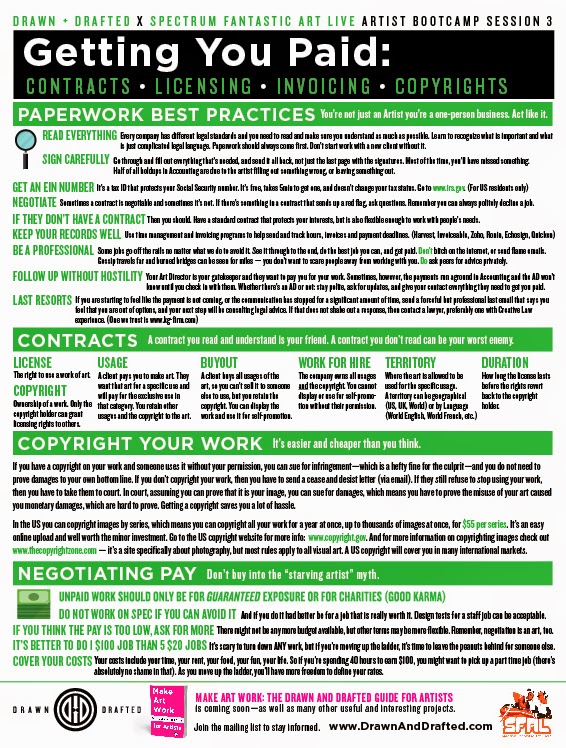
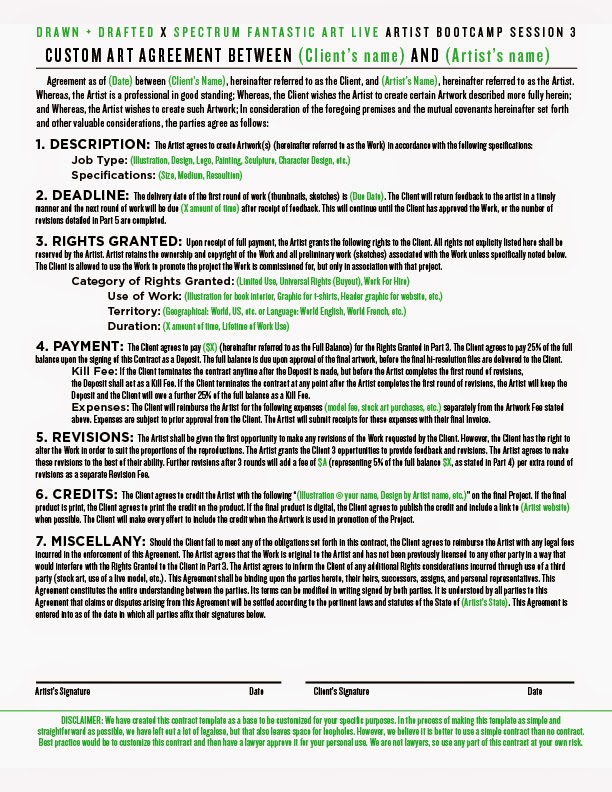


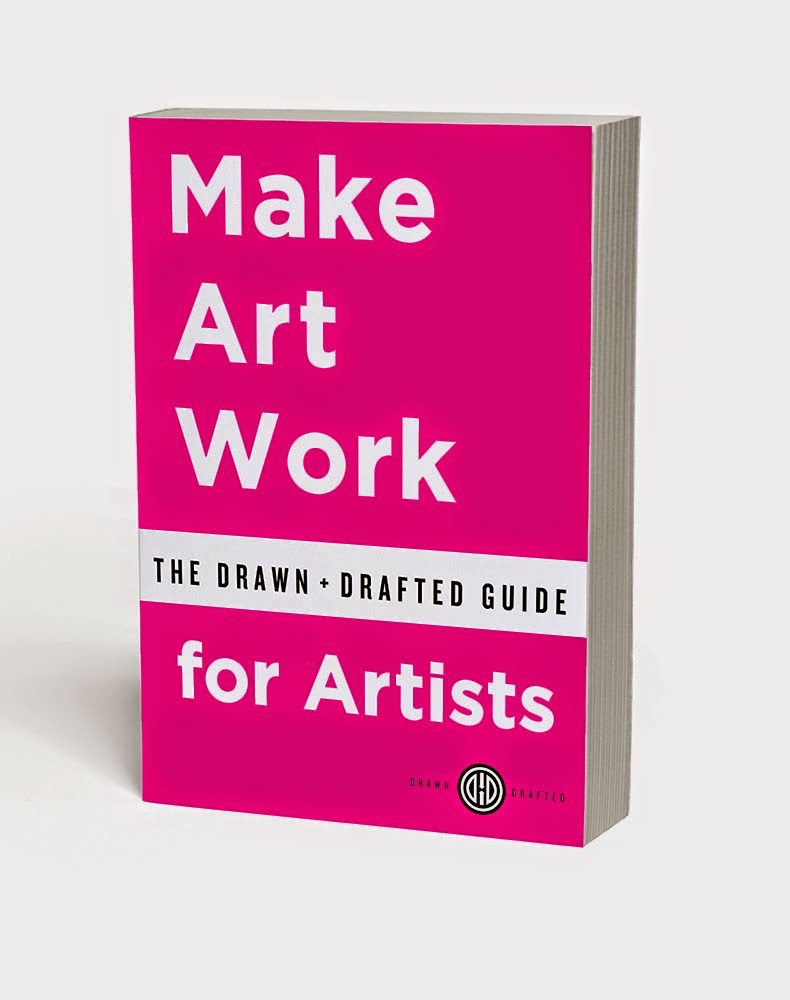
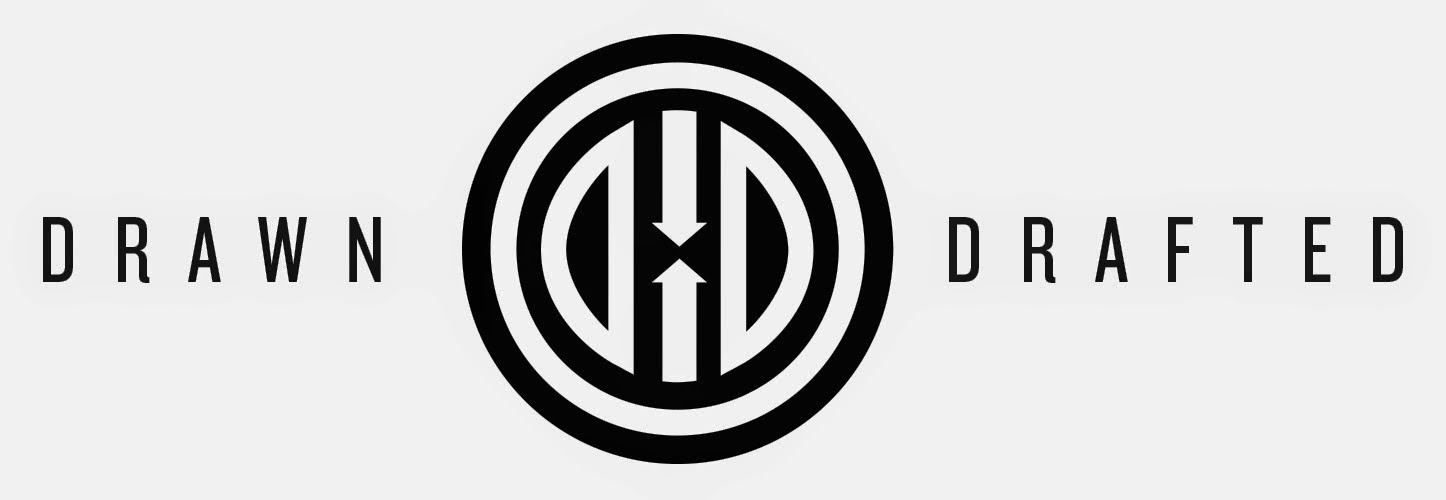


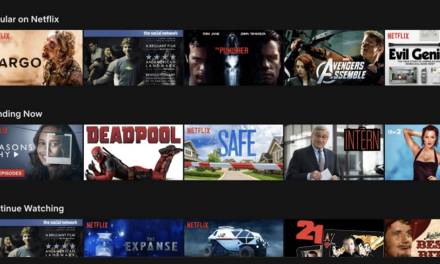

Thank you so much for these materials, they are needed in the industry. Already signed up to your newsletter and looking forward to the kickstarter campaign. All the best!
“Copyrighting your work is a step that should be as automatic as backing up your work, and it's cheaper and easier than you think. And it pays off immediately if you ever find someone stealing your work.”
Let me second this part of an already excellent post. Under the 1976/1977 revisions to the copyright laws, new work by all artists (writers, musicians, et al) is copyright by them upon the art's creation unless the art is “work for hire” as part of their employment. The artist retains the copyright until such time that they sell (or reassign) it or abandon it.
BUT if a copyright is infringed the artist is limited to suing for “compensatory (actual) damages”—i.e. the amount they would normally charge to create the piece if the infringer had hired them. The artist can try to seek noneconomic damages such as pain and suffering and emotional distress as part of their compensatory damages, but they're rarely if ever awarded in copyright cases. That's the limit they can attempt to recover UNLESS the artist has filed for formal copyright as referenced in Lauren's post.
With that formal paperwork in their pocket the artist is able to seek compensatory AND punitive damages, Punitive damage amounts awarded may vary between state and Federal statutes and there are no “official” caps, but in copyright cases it's usually 4 x compensatory damages. On top of that, the artist can be awarded attorney fees as well, a big deal since litigators can ouch you for $250+ an hour and the hours add up fast.
In other words, much like paying for an insurance policy you probably won't ever need (except maybe just that once!), filing for formal copyright of your art is worth it, for your peace of mind if nothing else.
EXACTLY. thank you for the details, Arnie!
The size of the contract should also reflect the kind of work you are doing. If you are doing a one time use illustration for a publication, the contract doesn't need to be longer than a page (there may be exceptions).
It doesn't need complicated wording either.
You should be able to read and understand a simple contract like this, without hiring a lawyer to make sure you aren't getting screwed. Overly complex contracts for simple work can be a red flag, or just the person over thinking.
Thanks a lot for the template 🙂
Love you all.
you're welcome!